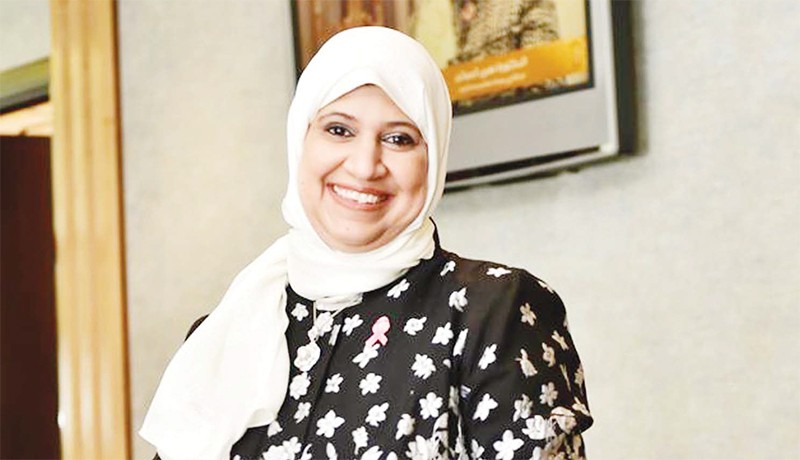17/03/2021
17/03/2021
According to the WHO, the COVID-19 has profoundly impacted cancer diagnosis and treatment worldwide, with 50 per cent of governmental cancer services wholly or partially disrupted. “Delays in diagnosis are common. Interruptions in therapy or abandonment have increased significantly,” said Dr Andre IIbawi from the WHO’s department of Non-Communicable Disease. This may likely impact the total number of cancer deaths in the coming years. An unspecified number of countries of all income levels have been affected. With significant reductions in research and clinical trial enrolment, the consequences on cancer control efforts have been profound, with breast cancer becoming the most common type of the disease.

Arab Times spoke to Dr Noha Al Saleh, one of Kuwait’s leading breast cancer specialists, about the impact of the pandemic on cancer treatment in the country. Dr Al Saleh is a Consultant in General Surgery and Surgical Oncology with the Royal Hayat Hospital. A Fellow of the Royal College of Physicians and Surgeons of Canada, she has previously worked at Kuwait Cancer Control Centre. Here, Dr Nohal Al Saleh speaks of the impact of the pandemic on cancer patients in Kuwait.
Arab Times: The WHO has said that Covid-19 has profoundly impacted cancer diagnosis and treatment worldwide. How bad has it been in Kuwait?
Dr Noha Al Saleh: Actually, the government of Kuwait did not stop us from proceeding with cancer diagnosis and treatments, including surgical therapies or all kinds of adjuvant treatments like chemotherapy or radiotherapy. True, there were some delays because of closure of KCCC due to staff being affected by the coronavirus, but that was only for about four weeks as compared to closures in other countries overwhelmed by corona patients. Thank god, we did not have this problem in Kuwait. So as oncologists, we didn’t stop treating or diagnosing cancer patients. One problem we have noticed lately is patients coming late for their consultation. They are afraid to come forward for diagnosis and treatment because they are locked at home or they are trying to observe social distancing, and so forth. This delay in consultation has made treatment of those patients more difficult.
AT: Has the effect been different on different types of cancer?
Dr Noha Al Saleh: I think it did not differ much because all urgent cases for all kinds of cancers were treated, whether in the government hospitals or private sector.
AT: It is said that cancer diagnosis is down because people avoid going to hospitals due to the pandemic.
Dr Noha Al Saleh: This is true. As I mentioned earlier, many patients who experienced something or felt something in their breast postponed seeking medical advice because of COVID, especially among the older age group. Unfortunately, this has affected their treatment and advanced their stage to an extent where they need more chemotherapy than if they had consulted earlier. We still see cases in the clinic that skipped their mammogram to avoid coming to the hospital in the pandemic situation.
AT: What are the symptoms of coronavirus infection in cancer patients? How does corona affect cancer patients?
Dr Noha Al Saleh: Corona symptoms are the same in cancer patients, including fever, cough and breathing difficulties. Cancer patients have good immunity if they have finished their treatments, and they are only taking their regular daily hormonal therapy. The problem happens with patients taking chemotherapy, and even worse, if chemotherapy is causing immunosuppression and low WBC, which makes them more susceptible to catching the virus than other patients.
AT: What about mental health in cancer patients during this challenging time?
Dr Noha Al Saleh: Usually, cancer patients go through a phase of denial and then depression once they are diagnosed. This is in the first stage of treatment. With the pandemic, I felt it has been easier for them to be locked in. People are being asked to avoid contacts with others and advised social distancing, which is perfect for a cancer patient undergoing active treatment. They need only their close relatives. So the pandemic has forced everybody into social isolation rather than only cancer patients.
AT: Are Covid 19 vaccines safe for cancer patients?
Dr Noha Al Saleh: Yes, the vaccine is safe for all cancer patients. Still, I think it easier if patients who are receiving chemotherapy postpone their vaccine until after they finish their chemotherapy and develop a normal immunity which probably takes about a month. But all other cancer patients who have completed their treatment long back are advised to take the vaccine for protection.
AT: Is it right that cancer research and drugs trials have also suffered a setback during the pandemic?
Dr Noha Al Saleh: I would partially think so as corona has affected many people, and because of this, researchers have also suffered from these consequences. There have been delays in cancer research and drug trials, but I think those people don’t ever stop finding cures. I am sure they have continued working but perhaps at a slower rate. On the other hand, all our big conferences and symposium that we attend annually were all carried out virtually to keep us updated in breast cancer treatments. Even in the pandemic, all conferences took place but virtually.


